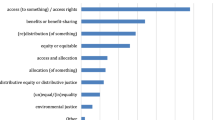Abstract
Access and Benefit Sharing (ABS) is a crucial objective of the Convention on Biological Diversity (CBD). It is this objective that gives an inclusive approach to the whole issue of conservation of biological resources. It also gives the local communities a sense of belonging and ownership of the natural resources around them. The implementation of the ABS mechanism since the signing of the CBD has raised many issues. With commitment and cooperation of all the players only can an effective system be in place. This chapter examines how ABS worked in the past in the Indian context and across other countries, what are the challenges that arose in the implementation and how they were overcome. It contains case studies of some important ABS instances in the country. Based on the past experience and legal provisions, it explores the multi-tiered responsibilities from a governance angle in the matter at global, national, state and local levels.
Access this chapter
Tax calculation will be finalised at checkout
Purchases are for personal use only
Similar content being viewed by others
References
Anitha Ramanna-Pathak (2017) Benefit sharing: reframing India’s policy. FNI Report 1/2017
Cape Town Dialogue (2014) Dialogue on practical ways forward for the implementation of the Nagoya Protocol Cape Town, South Africa, 30–31 January 2014 Report. The ABS Capacity Building Initiative
CBD (Secretariat of the Convention on Biological Diversity) (2008) Access and benefit sharing in practice: trends in partnerships across sectors. Montreal, Technical Series No. 38, 140 p
Dauda B, Dierickx K (2013)Benefit sharing: an exploration on the contextual discourse of a changing concept. BMC Med Ethics 14:36. https://doi.org/10.1186/1472-6939-14-36.
Dhar B, James TC, Vinayak P (2014a) National study on ABS implementation in India. http://www.absinitiative.info/fileadmin/media/Knowledge_Center/Pulications/ABS_Dialogue_042014/National_study_on_ABS_implementation_in_India_20140716.pdf
Dhar B, James TC and Pandey V (2014b) Access and benefit sharing under the biodiversity act: towards a more effective regime. RIS policy brief No. 65. Research and information system for develo** countries. ris.org.in
Jacob Thomson C, Reddy Achalendra C (2015) Implementation of the access and benefit sharing provisions of the biological diversity act, 2002: a case study on red seaweed (Kappaphycus alvarezii) in Asian Biotechnology and development review 17(3):19–31
Ministry of Environment, Forests and Climate Change. Annual Report 2017–18
NLSIU (National Law School of India University, Bengaluru, Centre for Environmental Law, Education, Research and Advocacy) (2019) Handbook on biological diversity and access and benefit sharing
Pandey R, Sane R, Yadav P, Agarwal S (2019) Biodiversity finance: identification and analysis of key building blocks of a biodiversity finance plan in India. National institute of public finance and policy, New Delhi, India
Schroeder D, Lucas Julie C (2013) Benefit sharing: from biodiversity to human genes. Springer
Secretariat of the Convention on Biological Diversity (2008) Access and benefit-sharing in practice: trends in partnerships across Sectors. Montreal, Technical Series No. 38
Syam N, Romero T (2021) Misappropriation of genetic resources and associated traditional knowledge: challenges posed by intellectual property and genetic sequence information. South Centre Research Paper 130. April 2021
Author information
Authors and Affiliations
Corresponding author
Editor information
Editors and Affiliations
Ethics declarations
Conflict of Interest
The views and opinions expressed in this article are those of the authors in their personal capacity. None of the observations, opinions, or conclusions expressed herein are to be attributed to or construed as the views or positions of any organization, association, or company. No conflict of interest.
Rights and permissions
Copyright information
© 2022 The Author(s), under exclusive license to Springer Nature Switzerland AG
About this chapter
Cite this chapter
James, T.C., Rajasekharan, S. (2022). Access and Benefit Sharing of Biological Resources and Associated TK: A Multi-tiered Responsibility. In: Oommen, O.V., Laladhas, K.P., Nelliyat, P., Pisupati, B. (eds) Biodiversity Conservation Through Access and Benefit Sharing (ABS). Springer, Cham. https://doi.org/10.1007/978-3-031-16186-5_5
Download citation
DOI: https://doi.org/10.1007/978-3-031-16186-5_5
Published:
Publisher Name: Springer, Cham
Print ISBN: 978-3-031-16185-8
Online ISBN: 978-3-031-16186-5
eBook Packages: Earth and Environmental ScienceEarth and Environmental Science (R0)




